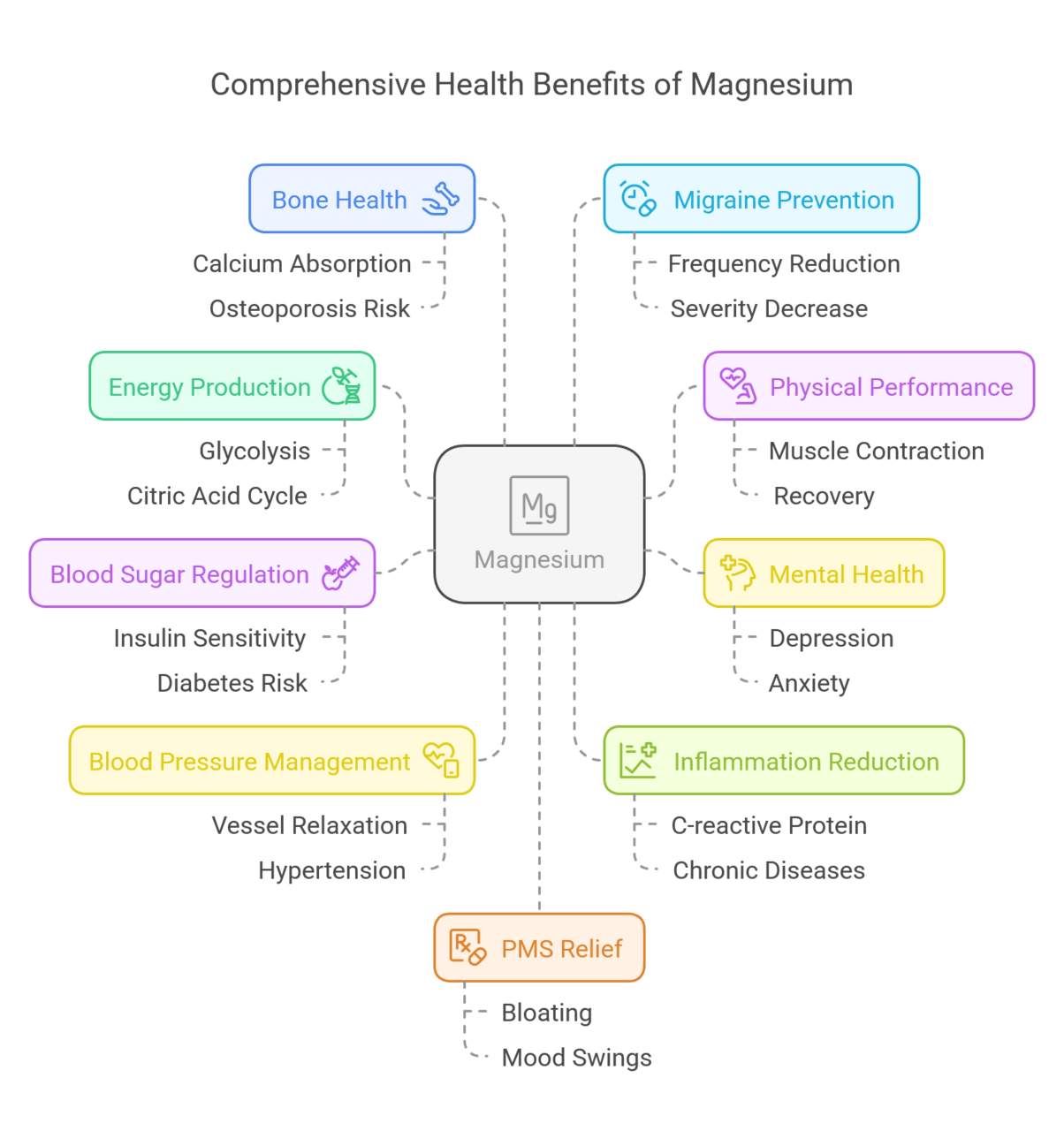
Introduction
Keeping your magnesium levels right is very important for good health. Many people do not pay enough attention to dietary intake of magnesium as an essential nutrient. As a result, they might not even know their magnesium status. It is essential to recognize how important this mineral is. Knowing the possible risks of not getting enough magnesium helps in preventing issues and supporting better health.
What Is Magnesium?
Magnesium is an important mineral for our bodies. It plays an important role in helping many functions work properly. For example, it is needed for numerous enzymes that take part in chemical reactions. These reactions help us make energy, build proteins, copy DNA, and keep our muscles working well.
Magnesium also helps keep our nerves healthy. It helps control blood sugar, manage blood pressure, and support a strong immune system. Keeping good magnesium levels is key for staying healthy and feeling good.
What Does Magnesium Do in the Body?
Magnesium is very important for managing how our muscles and nerves work. It helps muscles contract and relax, and it also supports the transmission of nerve signals. If magnesium levels are not balanced, it can lead to issues like cramps or weakness in muscles.
Also, magnesium is key for controlling blood sugar and insulin sensitivity. It helps cells use glucose. Low magnesium levels can raise the risk of metabolic syndrome and type 2 diabetes.
Moreover, magnesium plays a big role in keeping the heart healthy. It helps with heart rhythm, blood pressure, and the function of blood vessels. Getting enough magnesium can lower the chance of heart disease and the risk of stroke.
Different Forms of Magnesium (Natural vs. Supplement)
Magnesium is found in many forms. You can get it from natural sources like green leafy vegetables and nuts. There are also supplements, such as magnesium citrate and magnesium oxide. Natural sources give you extra nutrients, but supplements are handy for people who have low magnesium levels or trouble absorbing this mineral. Knowing the differences between natural food sources and supplements can help you pick the right option for your magnesium status. Both types are important for keeping good magnesium levels and supporting your overall health and well-being.
Table: Comparison of Common Magnesium Supplement Forms
| Type of Magnesium | Absorption Level | Primary Benefit | Common Use | Notes |
|---|---|---|---|---|
| Magnesium Citrate | High | Laxative effect | Constipation relief | May cause loose stools |
| Magnesium Glycinate | High | Calming | Anxiety, Sleep | Gentle on stomach |
| Magnesium Oxide | Low | Budget option | General use | Poor absorption |
| Magnesium Threonate | Moderate | Cognitive health | Brain support | Expensive, less common |
Health Benefits of Magnesium

Magnesium is an important mineral. It helps with many health benefits. It supports energy production and promotes bone health. Magnesium is key for feeling good overall.
In this blog post, we will look at the many benefits of magnesium. We will see how it can help different areas of health.
Supports Energy Production and Enzymatic Reactions
Magnesium is important for making energy in the body’s cells. It helps enzymes work in glycolysis and the citric acid cycle. These processes change glucose into ATP, which is how the body stores energy and regulates parathyroid hormone levels.
Having enough magnesium is key for good energy production. If your magnesium levels are low, you may feel tired, have less energy, and perform poorly physically. Magnesium helps the enzymes that support energy production, making sure the body gets enough energy for daily tasks.
Keeping your magnesium levels up through a healthy diet or supplements can help improve energy production, reduce tiredness, and increase overall health.
Enhances Physical Performance and Recovery
Magnesium is very important for how muscles work. It affects how well you perform during physical activities and how quickly you recover. It helps muscles contract and relax by managing how calcium moves in muscle cells.
When you exercise, your magnesium levels can drop. This can cause muscle fatigue, cramps, and hurt your performance. Taking magnesium supplements can help you recover faster, reduce soreness, and boost exercise performance, especially if you have low magnesium levels.
Getting enough magnesium intake is key for athletes and those who regularly work out. It helps to improve performance and supports muscle recovery.
Supports Mental Health (Depression & Anxiety)
Magnesium is very important for mental health. It may help reduce symptoms of depression and anxiety, especially in postmenopausal women. Studies show that low magnesium levels might raise the risk of these issues. Eating foods like green leafy vegetables or using supplements can help improve how our brain chemicals work. This, in turn, may help with mood control. Getting enough magnesium in your diet could be good for people facing mental health problems. However, it is a good idea to talk to a healthcare provider before making big changes to your diet or starting new supplements.
Improves Blood Sugar Regulation
Magnesium is important for managing blood sugar. It helps improve insulin sensitivity. Insulin is a hormone that helps cells absorb glucose from the blood, keeping blood sugar levels in check.
Research shows that the role of magnesium can boost insulin sensitivity. This means cells can use glucose better. However, a lack of magnesium can lead to insulin resistance. This is a main issue in getting type 2 diabetes mellitus.
Keeping good magnesium levels through your food or supplements could help improve insulin sensitivity. It may also help keep blood sugar levels healthy and lower the chance of diabetes.
Helps Maintain Healthy Blood Pressure
Magnesium is very important for keeping blood pressure at a healthy level. It works like a natural blocker for calcium channels. This helps to relax blood vessels and lets blood flow more freely.
Research has shown that eating more magnesium can lower the chance of getting high blood pressure, and higher levels of magnesium intake can enhance this effect. Also, taking magnesium supplements has been shown to reduce blood pressure in people with hypertension.
By making blood vessels relax and improving blood flow, magnesium helps heart health. It also lowers the risk of heart disease and stroke.
Reduces Inflammation
Chronic inflammation can lead to many long-term health problems. These problems include heart disease, arthritis, and some cancers. Magnesium plays a key role in reducing inflammation in the body.
Research shows that getting enough magnesium may lower markers of inflammation, like C-reactive protein (CRP). Magnesium can help because it stops the body from making inflammatory cytokines.
Having good magnesium levels in your diet or through supplements may help decrease chronic inflammation. This could lower your risk of chronic diseases.
Supports Bone Density and Structure
Magnesium is important for bone health. It helps form bones and keeps their mineral density strong. Each day, adequate mg of magnesium also helps your body absorb calcium, which is essential for healthy bones.
Research shows that getting enough magnesium is linked to higher mineral density in bones and a lower chance of developing osteoporosis. If you don’t get enough magnesium, it can hurt calcium absorption and make bones weaker.
To support bone health and lower the chance of fractures, it’s important to have enough magnesium in your diet or through supplements.
May Prevent Migraines
Migraine headaches can be very painful. They come with strong pain, nausea, and a sensitivity to light and sound. Recent research says that magnesium might help prevent migraine attacks.
Some studies show that people who have migraines often have lower magnesium levels than those who do not. Magnesium supplementation has helped some people lessen how often and how bad their migraine headaches are.
We still need more studies to clearly see how magnesium relates to migraines. However, keeping magnesium levels up may help lessen the number of these tough headaches.
Eases Premenstrual Syndrome (PMS) Symptoms
Magnesium may help reduce symptoms of premenstrual syndrome (PMS). Studies show that having enough magnesium can ease issues like bloating, mood swings, and breast tenderness that often come with PMS. Since magnesium helps muscles contract and relax, it might also relieve menstrual cramps and improve your overall health during your cycle. Eating foods rich in magnesium or taking supplements may be a good way to manage PMS symptoms naturally. Pay attention to your magnesium status to help lessen the discomforts that come with PMS.
Supports Hormonal Balance (Estrogen, Thyroid, Menopause)
Magnesium is important for keeping hormones balanced. It helps control estrogen levels, supports thyroid health, and reduces menopausal symptoms. Getting enough magnesium can help the body manage estrogen better, which is key for hormone balance. Magnesium also helps the thyroid work by changing T4 into the active T3 hormone. For women going through menopause, magnesium can lessen issues like hot flashes and mood changes. By making sure you have good magnesium levels, you can support your overall hormonal health and benefit your reproductive and metabolic systems.
Magnesium Benefits for Sleep, Stress, and Mood
Magnesium is important for helping you relax, sleep better, and lower stress. It works on the nervous system by calming down nerve activity. This brings a feeling of calmness.
Research shows that magnesium supplementation can lead to better sleep quality. It can also help you fall asleep faster and get more total sleep. Plus, magnesium helps control mood-related substances, like serotonin.
By lowering stress, encouraging relaxation, and keeping neurotransmitters balanced, magnesium helps boost sleep, cut down stress, and improve your mood.
Supports Digestive Health (Motility, Constipation, IBS)
Magnesium is important for digestive health. It helps with how well digestion works, reduces constipation, and helps control symptoms of irritable bowel syndrome (IBS). When you have enough magnesium levels, it improves muscle contraction in the digestive system. This helps with regular bowel movements and makes constipation less uncomfortable. For those with IBS, magnesium supplementation could assist in regulating bowel function and reducing stomach issues. By affecting muscle tone and relaxation in the intestines, magnesium plays a key role in keeping your gut healthy and supporting good digestion overall.
Supports Brain Function and Mental Clarity
Magnesium is essential for keeping the brain working well and improving mental clarity. It is important for sending messages in nerves, changing connections in the brain, and making neurotransmitters.
Research shows that having enough magnesium levels can lead to better thinking, memory, and learning. Meanwhile, not having enough magnesium is connected to memory issues, less brain power, and a higher chance of brain diseases like Alzheimer’s.
By helping nerves function, balancing neurotransmitters, and protecting brain cells from harm, magnesium helps keep the brain healthy and supports good mental well-being.
Magnesium Sources: Food, Water, and Supplements

Magnesium is found naturally in many foods, which makes it simple to add to your daily meals. Leafy green veggies, nuts, seeds, and whole grains all offer good sources of this important mineral, in line with national health recommendations.
Also, if you do not get enough magnesium from food, supplements are easy to find. The right type of supplement and the right amount can change based on your specific needs and health conditions.
High-Magnesium Foods for Every Diet
Incorporating foods that are high in magnesium into your diet is important to keep the right levels of this vital mineral. Here are some great sources of magnesium to add to your meals and snacks:
- Green Leafy Vegetables: Spinach, kale, and Swiss chard have a lot of magnesium and other key nutrients.
- Nuts and Seeds: Almonds, cashews, pumpkin seeds, and chia seeds are great sources of magnesium and healthy fats.
- Dark Chocolate: Good news for those who love chocolate! Dark chocolate with 70% cocoa or more has a good amount of magnesium.
- Legumes: Black beans, lentils, and chickpeas are high in magnesium and also provide fiber and protein.
- Avocados: This creamy fruit offers magnesium, healthy fats, and fiber.
By adding these magnesium-rich foods into a healthy diet, you can meet your daily needs and enjoy the many health benefits magnesium has to offer.
Comparing Plant-Based and Animal-Based Magnesium Sources
Both plant-based and animal-based foods help us get the magnesium we need. There are many options available. Plant-based sources are rich in magnesium, especially green leafy vegetables, nuts, seeds, legumes, and whole grains.
These foods provide magnesium along with many vitamins, minerals, fiber, and antioxidants. This supports our overall health. Animal-based sources, like fatty fish such as salmon and mackerel, also give us a good amount of magnesium.
In the end, having a mix of plant-based and animal-based foods in your meals can help you get enough magnesium. This way, you can have a well-rounded diet that supports your overall health.
Table: Magnesium-Rich Foods for Every Lifestyle and Diet
| Food | Magnesium per Serving | Diet Type | Absorption Boosters | Notes |
|---|---|---|---|---|
| Pumpkin Seeds | 156 mg (1/4 cup) | Vegan / Vegetarian | Pair with vitamin C-rich foods | Also high in zinc & iron |
| Spinach (Cooked) | 157 mg (1 cup) | Vegan / Vegetarian | Light cooking increases bioavailability | Rich in iron & folate |
| Dark Chocolate (70%+) | 64 mg (1 oz / 28 g) | All Diets | Choose >70% cacao | Contains heart-healthy flavanols |
| Almonds | 80 mg (1 oz / 23 nuts) | Vegan / Keto | Soak overnight to reduce phytates | Great snack for blood sugar control |
| Black Beans (Cooked) | 120 mg (1 cup) | Vegan / Vegetarian | Ferment or sprout for better absorption | High in fiber & plant protein |
| Salmon (Wild-Caught) | 53 mg (6 oz fillet) | Paleo / Keto / Omnivore | Cook with bones for extra minerals | Rich in omega-3s |
| Avocado | 58 mg (1 medium) | Vegan / Keto | Combine with nuts/seeds | Healthy fats enhance magnesium uptake |
| Quinoa (Cooked) | 118 mg (1 cup) | Vegan / Gluten-Free | Rinse well to remove saponins | Complete protein source |
| Greek Yogurt (Plain) | 50 mg (1 cup) | Vegetarian / Keto | Choose plain, full-fat versions | Probiotics aid magnesium absorption |
| Banana | 32 mg (1 medium) | All Diets | Eat slightly underripe | Portable energy source |
Magnesium in Drinking Water
The minerals in drinking water can change based on where the water comes from and how it is treated. Hard water has more minerals like calcium and magnesium. This can help with dietary magnesium intake.
Though the amount of magnesium in drinking water is not as high as what you get from food, it can still be part of your overall intake. What affects the magnesium content in water includes the rocks the water passes through and how it is treated.
If you are worried about your magnesium intake, you might think about drinking water that is rich in minerals or using a filter that adds minerals.
How to Add More Magnesium to Your Diet
Boosting your magnesium intake is easy. You can make simple changes to your diet. Here are some suggestions to add this important mineral to your daily life:
- Embrace Magnesium-Rich Foods: Add different foods like leafy greens, nuts, seeds, and legumes to your meals and snacks.
- Start Your Day with a Magnesium Boost: Choose a breakfast full of magnesium, like overnight oats with chia seeds and almonds or a smoothie with spinach and avocado.
- Snack Smart: Have magnesium-rich snacks ready, such as a handful of almonds, pumpkin seeds, or a piece of dark chocolate (at least 70% cocoa).
If you find it hard to get enough magnesium from food alone or have health issues, talk to a healthcare professional. They can help you decide if magnesium supplements are right for you.
Supplement Types and Their Bioavailability
Magnesium supplements come in different forms. Each form is absorbed by the body at different rates and has different benefits. It’s important to pick a type that your body can easily absorb and use.
Magnesium citrate is well-absorbed and is known for helping with constipation due to its laxative effect. Magnesium hydroxide, often used for similar purposes, is another form of magnesium that can aid with constipation. Magnesium glycinate is also well-absorbed. It is known for its calming effects and can help with sleep and anxiety.
On the other hand, magnesium oxide is a common choice but is less well-absorbed than citrate or glycinate. Speaking with a healthcare professional can help you find the right magnesium supplement and the right dosage for your individual needs and health.
| Form | Absorption Rate | Best For | Drawbacks |
|---|---|---|---|
| Magnesium Glycinate | High (80–90%) | • Stress and anxiety • Sleep support • Chronic deficiency |
Mildly more expensive |
| Magnesium Citrate | Moderate–High (~60%) | • Constipation relief • General supplementation |
May cause loose stools |
| Magnesium Malate | Moderate (50–60%) | • Muscle pain (e.g., fibromyalgia) • Fatigue |
Sour taste in some brands |
| Magnesium L-Threonate | High (crosses BBB) | • Brain function • Cognitive performance • Memory |
Most expensive form |
| Magnesium Oxide | Low (4–10%) | • Occasional heartburn • Budget-friendly option |
Poor absorption; laxative effect |
| Magnesium Chloride | Moderate (~60%) | • Topical application (oils, sprays) • Detox support |
May cause skin irritation |
| Magnesium Sulfate | Low (Epsom salts) | • Muscle relaxation • Bath-based stress relief |
Not intended for oral consumption |
Important Note: Always consult with a healthcare professional before starting any magnesium supplement, especially if you have existing health conditions or take medications.
Daily Magnesium Requirements

The daily amount of magnesium you should have depends on your age, gender, and life stage. Usually, men need a bit more magnesium than women. Pregnant and breastfeeding people need even more magnesium.
It’s important to get enough magnesium to help your body function well and avoid deficiencies. Checking dietary guidelines or talking to a healthcare professional can help you get the right advice on magnesium intake.
Recommended Intake by Age, Gender, and Life Stage
The recommended dietary allowance (RDA) for magnesium is the daily intake level sufficient to meet the nutrient requirements of nearly all healthy individuals.
Here’s a general guideline for magnesium intake based on age and gender:
| Group | Age Range | RDA (mg/day) | Special Notes |
|---|---|---|---|
| Infants | 0–6 months | 30* | *Adequate Intake (AI) from breastmilk or formula |
| 7–12 months | 75* | Introduce magnesium-rich solids (bananas, avocados) | |
| Children | 1–3 years | 80 | Whole grains, nut butters |
| 4–8 years | 130 | Dark chocolate (in moderation) | |
| Males | 9–13 years | 240 | Active teens may need +10–20% more |
| 14–18 years | 410 | Critical for muscle and bone development | |
| 19–30 years | 400 | Stress and physical activity increase needs | |
| 31+ years | 420 | Supports cardiovascular health with age | |
| Females | 9–13 years | 240 | Monitor intake if experiencing heavy menstrual cycles |
| 14–18 years | 360 | PMS may be linked to low magnesium | |
| 19–30 years | 310 | Oral contraceptives can deplete magnesium | |
| 31+ years | 320 | Helps maintain bone density post-menopause | |
| Pregnancy | <18 years | 400 | Supports fetal growth, reduces muscle cramps |
| 19–30 years | 350 | May help prevent preterm labor | |
| 31–50 years | 360 | Balance with calcium intake | |
| Lactation | <18 years | 360 | Essential for milk production |
| 19–30 years | 310 | Baby’s needs increase magnesium demand | |
| 31–50 years | 320 | Replenish levels through diet or supplements |
Pregnant women and breastfeeding individuals generally require higher amounts of magnesium. Consult with a healthcare professional to determine individual needs during these life stages.
Safe Dosage and Upper Limits
Magnesium is important for good health, but taking too much can lead to problems. The tolerable upper intake level (UL) is the most you can safely take each day without causing harm.
For adults, the UL for magnesium from supplements is 350 mg per day. This limit is only for magnesium from supplements, not from food.
Going over the UL can lead to gastrointestinal problems, such as diarrhea, nausea, and stomach cramps. It’s important to follow the recommended dosages. You should also talk to a healthcare professional before starting magnesium supplements, especially if you have any health issues.
Magnesium Deficiency: Causes, Symptoms, and Risk Groups
Magnesium deficiency may not always show symptoms, but it can cause health problems. Some things may raise the risk of not getting enough magnesium. These include what you eat, medical issues, and your lifestyle choices.
It’s essential to understand why this happens. You should also notice the signs and know who is at higher risk. This can help in managing and preventing any health problems related to magnesium deficiency.
How to Tell if You’re Magnesium Deficient
Detecting a lack of magnesium can be tough. The signs are often mild and can resemble other issues. Still, some common symptoms might show low magnesium levels.
These may include feeling tired, muscle weakness or cramps, loss of appetite, nausea, vomiting, personality changes, trouble sleeping, and feeling irritable. If you think you might have low magnesium, it’s important to talk to a healthcare expert.
They can look at what you eat, your health background, and do blood tests to check serum magnesium levels. This will help them make an accurate diagnosis and suggest the right steps to take.
Common Causes and Risk Factors
There are many reasons why someone might have low magnesium levels. A big reason is not getting enough magnesium from food. This often happens when people do not eat enough foods that are high in magnesium, like green leafy vegetables, nuts, seeds, and whole grains.
Some health issues can also raise the chance of not having enough magnesium. For example, conditions like Crohn’s disease and celiac disease can make it hard for the body to absorb nutrients.
Drinking too much alcohol, taking certain medicines for a long time, like proton pump inhibitors or diuretics, and having type 2 diabetes can also cause a loss of magnesium. This increases the chance of having a magnesium deficiency.
Who Is Most at Risk for Magnesium Deficiency?
Magnesium deficiency can happen to anyone, but some groups have a higher risk:
- Older Adults: As we get older, it becomes harder to absorb magnesium from food. This raises the chance of magnesium deficiency in older people.
- People with Gastrointestinal Disorders: Issues like Crohn’s disease and celiac disease can affect how well nutrients are absorbed, putting these individuals at risk.
- Individuals with Type 2 Diabetes: When diabetes is not well managed, it may cause more magnesium to be lost in urine, raising the risk of not having enough.
- Those with Kidney Disease: Damaged kidneys might lose too much magnesium, which can lead to low magnesium levels.
It’s important to identify these at-risk groups early and act to reduce the health effects of magnesium deficiency.
Side Effects and Magnesium Toxicity

Magnesium is usually safe when taken in recommended amounts. However, taking too much can cause magnesium toxicity. This problem usually happens with high-dose supplements, not with the food we eat.
It’s important to know the side effects of magnesium toxicity and to spot the symptoms. This can help avoid any bad effects.
Gastrointestinal Side Effects
One common side effect of taking too much magnesium is stomach problems. Taking oral magnesium supplements, especially in high doses, can lead to diarrhea, nausea, stomach cramps, and bloating. These issues usually happen if you take magnesium on an empty stomach or take more than the recommended amount.
Magnesium citrate is one type that can cause these problems more often. It is more available to the body, but it also acts as a laxative, unlike magnesium glycinate.
If you have stomach issues from magnesium supplements, try lowering the dose or switching to another type.
Signs of Magnesium Overdose
Magnesium overdose is a serious health issue that needs urgent care. While it is rare, it can happen with high doses of magnesium supplements that go beyond the tolerable upper intake level.
Signs of magnesium overdose can include bad diarrhea, nausea, vomiting, low blood pressure, muscle weakness, trouble breathing, an irregular heartbeat, and in serious cases, coma. If you think someone has overdosed on magnesium, get emergency help right away.
It’s very important to keep magnesium supplements out of reach of children. Always follow the recommended dosages to avoid any accidental overdose.
Risk Factors for Magnesium Toxicity
Magnesium toxicity is rare. However, some people are at a higher risk because their bodies may struggle to get rid of extra magnesium.
Those with kidney disease are especially at risk. Their kidneys are important for filtering and removing extra magnesium. If kidney function is not good, magnesium can build up and become toxic. Also, taking high doses of magnesium supplements, especially ones that are easy for the body to absorb, raises this risk.
It is very important to talk to a healthcare professional before using magnesium supplements. This is especially true if you have any health problems.
Magnesium Interactions with Drugs and Nutrients

Magnesium can affect how some medicines and nutrients work in your body. It may change how your body takes them in, uses them, or their overall effect. These interactions can either improve or lessen how well the medicines or nutrients work.
It’s very important to know about these interactions. This knowledge can help make sure your medications work well and avoid any harmful side effects.
Medications That Can Lower Magnesium Levels
Certain medications can affect magnesium levels in the body. They may do this by increasing the amount of magnesium that is released in urine or by blocking its absorption in the gut.
Common medicines that cause these issues include diuretics. These are often prescribed for high blood pressure and heart failure. Diuretics increase urine production, which can flush out magnesium along with other electrolytes.
Proton pump inhibitors (PPIs) are another example of drug administration. These are used to lower stomach acid. Long-term use of PPIs can also drop magnesium levels. It is very important to tell your doctor about all medications, supplements, and over-the-counter drugs you take. This helps avoid possible drug interactions and magnesium deficiency.
Nutrients That Affect Magnesium Absorption
The way our body absorbs magnesium can be affected by other nutrients in our food. For example, having too much calcium can block magnesium absorption, especially if magnesium levels are already low. This happens because calcium and magnesium have to share space in the gut when being absorbed.
On the other hand, taking magnesium with vitamin D can improve its absorption, as noted in research from the National Health and Nutrition Examination Survey. Vitamin D helps move magnesium through the small intestine better. Also, dietary fiber, especially insoluble fiber, can attach to magnesium and decrease how much we absorb.
Knowing how these nutrients interact can help us make the most of magnesium absorption and avoid low magnesium levels.
Common Drug-Magnesium Interactions
Some drugs can interact with magnesium, which is important to know. These interactions can affect how well your medicine works and may even cause side effects. For example, magnesium can stop the body from absorbing some antibiotics, like tetracyclines and quinolones. This can make these antibiotics less effective.
To avoid this, it’s best to take magnesium supplements and these antibiotics at least two hours apart. Magnesium can also enhance the effects of blood pressure medications. This might lead to blood pressure that is too low.
It’s a good idea to regularly check your list of medications with your healthcare provider. This includes any supplements you take. Doing this can help spot and manage any drug-magnesium interactions.
Table: Magnesium Interactions with Drugs and Supplements
| Interacting Substance | Effect on Magnesium | Mechanism | Recommendation |
|---|---|---|---|
| Proton Pump Inhibitors (e.g., omeprazole) | Reduces absorption | Lowers stomach acid, reducing magnesium solubility | Monitor levels; consider citrate/glycinate forms |
| Diuretics (e.g., furosemide) | Increases excretion | Promotes urinary loss of magnesium and electrolytes | Supplement if necessary under medical supervision |
| Tetracycline & Quinolone Antibiotics | Decreases drug absorption | Binds to magnesium, forming insoluble compounds | Take 2–4 hours apart from magnesium supplements |
| Calcium Supplements (high dose) | Decreases absorption | Competes with magnesium for absorption in the gut | Maintain Ca:Mg intake ratio (2:1, e.g. 1000 mg Ca → 500 mg Mg) |
| Vitamin D | Enhances absorption | Activates magnesium transport channels in intestines | Pair with magnesium for bone and immune health |
| Zinc Supplements (high dose) | Reduces magnesium uptake | Competes for the same intestinal transporters | Limit zinc to <40 mg/day; space intake from magnesium |
| Alcohol | Depletes magnesium stores | Increases urinary excretion | Increase magnesium intake if consuming alcohol regularly |
| High-Fiber Diets | May reduce absorption | Phytates and fiber bind magnesium in the gut | Soak/sprout grains; take magnesium separately from high-fiber meals |
Optimizing Magnesium Absorption

To get the most health benefits from magnesium, it’s important to absorb as much as possible. Knowing how your gut health and some of your dietary and lifestyle choices affect absorption can help you make better choices.
By optimizing your magnesium intake, you can make sure that your body gets enough of this important mineral.
Role of Gut Health and Stomach Acid
A healthy gut is very important for good magnesium absorption. Most of the magnesium we absorb happens in the small intestine. If gut health is not good, it can affect how well we absorb this nutrient.
Production of enough stomach acid is also key for absorbing magnesium. Stomach acid helps turn magnesium into a form that is easier to absorb in the small intestine.
Some conditions, like low stomach acid (hypochlorhydria), can make it hard to take in magnesium. Lifestyle factors, such as long-term stress, can hurt gut health and nutrient absorption. This shows why managing stress is important for overall health.
Nutrients and Conditions That Impact Absorption
Several things can affect how well the body absorbs magnesium. One of them is the intake of certain nutrients. For example, if you take in a lot of calcium while having low magnesium levels, it can make it harder for your body to absorb magnesium. This is because calcium competes for the same transporters in the gut.
Also, some health issues like celiac disease and Crohn’s disease can hurt magnesium absorption. These problems damage the lining of the small intestine. This damage makes the area smaller and stops nutrients from getting absorbed well.
If you have a digestive issue, it is important to talk to a healthcare professional. They can help manage your condition and look into possible supplements to fix any nutrient deficits.
Magnesium Supplementation Guide

When choosing magnesium supplements, you need to think about a few things. These include the type of magnesium, the right amount to take, and your personal needs. Picking the right magnesium supplement can help it work better and reduce possible side effects.
It’s a good idea to talk to a doctor. They can help you find the right magnesium supplement and how much you should take, based on your health and what you need.
Choosing the Best Magnesium Supplement
Choosing the right magnesium supplement means knowing the different types and their benefits. Magnesium citrate is very easy for the body to absorb. It works well for people who have constipation because it can help relieve that issue.
Magnesium glycinate is another form that the body absorbs well. It is gentle on the stomach, making it a good choice for people who have sensitive digestive systems. This form is also known for helping with sleep and reducing anxiety.
Magnesium oxide is common but it doesn’t absorb well compared to citrate or glycinate. The best magnesium supplement depends on what each person needs and their health goals. It’s important to get advice from a healthcare professional.
How Much Magnesium Should You Take?
Choosing the right amount of magnesium is important. You need to think about your age, gender, health, and diet. The daily amount you should take can change. If you take too much, it could cause problems.
Always check the dosage instructions on supplement labels. It’s a good idea to talk to a healthcare professional, too. They can evaluate your magnesium status and check for any possible drug interactions. This way, you will find a safe dosage that works for you.
Keep in mind that taking more magnesium isn’t always better. Going over the recommended amount can lead to issues like stomach problems and other side effects.
Best Time and Way to Take Magnesium
To get the best out of magnesium, when and how you take it are important. Taking magnesium supplements with food usually helps your body soak it up better and reduces stomach upset.
But some types, like magnesium citrate, are taken on an empty stomach because they can act as a laxative. Splitting your total dose into smaller amounts throughout the day can also help with absorption.
Plus, adding foods high in magnesium to your meals gives a steady supply of the nutrient, which helps keep your blood levels steady all day.
Magnesium for Athletes

Magnesium is an important mineral for athletes, as noted in J Am Coll Nutr. It helps with muscle function, energy production, and recovery. When athletes exercise hard, they can lose magnesium. This is why it’s important for them to get enough magnesium to improve their performance and support their bodies.
Knowing the benefits of magnesium and how much to take can help athletes make smart choices about magnesium supplementation.
Benefits for Muscle Function and Performance
Magnesium is very important for how our muscles work. It helps with muscle contraction, relaxation, and keeping electrolytes balanced. When you exercise, you can lose magnesium through sweat and increased use. This loss can cause muscle cramps, tiredness, and poor performance.
Getting enough magnesium can help athletes make their muscles work better. It can also lower the chances of cramps during exercise and boost overall performance. Magnesium also helps athletes create energy from food, which is very helpful.
Athletes should focus on eating foods rich in magnesium. They might also think about taking supplements but should do so with help from a doctor or a nutrition expert.
Magnesium Dosage for Active Lifestyles
Finding the right amount of magnesium for athletes depends on several things. These include how hard they train, how long they train, how much they sweat, and what they usually eat. Active people need more magnesium than those who do not exercise because they lose more through sweating.
For people doing moderate activities, a balanced diet that includes magnesium is usually enough. But athletes who train hard or for a long time might need extra magnesium from supplements. It’s very important to talk to a sports nutritionist or healthcare worker to get the best dosage for individual needs and training levels.
Also, taking too much magnesium beyond the tolerable upper intake level (UL) can cause stomach issues. This shows that getting personalized advice is important.
Magnesium in Special Populations
Magnesium needs can be different based on age and health. It’s important to follow special advice for certain groups, especially concerning magnesium concentrations. This includes pregnant and breastfeeding women, older adults, and children. We should make sure these people get enough magnesium.
They might need more magnesium because their bodies use it differently. They could also face possible shortages or issues caused by medicine or existing health problems.
Magnesium Needs During Pregnancy and Breastfeeding
Pregnancy and breastfeeding need more magnesium. This is because the body has to support the baby’s growth, change for the mother’s body, and make milk. Magnesium is important for many processes during this time. It helps with baby development, muscle function in the uterus, and stops early labor.
Low magnesium levels during pregnancy can lead to issues like preeclampsia and gestational diabetes.
Women who are pregnant or breastfeeding should talk to their doctor about their magnesium intake. This helps them ensure they get enough magnesium either from their diet or supplements, supporting the health of both mother and baby.
Magnesium for Older Adults
As we get older, our need for magnesium usually goes up. However, our ability to absorb and use this mineral might go down. Older adults are also more likely to experience health problems related to age or use medicines that can lower magnesium levels.
When older adults don’t get enough magnesium, they face a higher risk of issues like osteoporosis, heart disease, problems with thinking, type 2 diabetes, and loss of skeletal muscle mass. It’s important for this group to have enough magnesium through a balanced diet that includes foods high in magnesium.
If their food doesn’t provide enough magnesium, they may need supplements. Older adults should talk to their doctor to check their magnesium status and plan the right diet or supplement options.
Children and Teens: Magnesium for Growth and Development
Adequate magnesium intake is very important during childhood and adolescence. It helps with proper growth and development. Magnesium is crucial for bone formation, muscle function, nerve development, and energy production, all of which are needed for healthy growth.
Children and teenagers may need more magnesium because they grow quickly and have high energy needs. A balanced diet that has plenty of magnesium-rich foods is very important.
Parents and caregivers should focus on including magnesium-rich foods in meals. Good options include leafy green vegetables, nuts, seeds, and whole grains as part of a healthy diet.
When to Consult a Healthcare Provider
Warning signs that need medical help include strong muscle cramps or spasms, unusual heart rhythms, and changes in personality. If you notice these symptoms, you should seek medical advice quickly. If you have health issues like kidney disease or take certain medications, testing for magnesium deficiency might be important. Always talk to a healthcare provider before starting magnesium supplementation, especially if you have chronic diseases or are on medications that may interact with magnesium. It is key to make any changes in your magnesium intake under medical supervision to avoid any bad effects.
Warning Signs That Need Medical Attention
Numbness, tingling, muscle cramps, and unusual heart rhythms can show a serious lack of magnesium in your body. These symptoms mean that your magnesium levels are not right, and you should see a doctor right away. Seizures, changes in personality, and tiredness also need urgent attention to fix low magnesium levels. If you notice these ongoing symptoms, it’s important to get medical help to check your magnesium status. Don’t ignore these signs; they may point to other health problems that need a doctor’s care.
Testing and Diagnosing Magnesium Deficiency
Testing for magnesium deficiency is important for knowing your magnesium status. Blood tests that check serum magnesium levels are often used, but they might not show the real magnesium levels in your body tissues. Other tests, such as the magnesium loading test or the red blood cell magnesium test, give better insights into your magnesium levels. Signs like muscle cramps, tiredness, and unusual heart rhythms may point to low magnesium levels, which can require more checks. It is essential to talk to a healthcare provider for the right tests and to understand the results correctly.
Conclusion
In conclusion, it is very important to get enough magnesium for good health. Magnesium supports mental health, helps balance hormones, eases PMS symptoms, and improves digestion. When you notice things like muscle cramps, tiredness, or an uneven heartbeat, it’s essential to talk to a doctor. They can check your magnesium status and find out if you have a deficiency. With the right tests, they can suggest changes to your diet or recommend supplements. Focusing on magnesium levels can really make a difference in your health and boost your quality of life.
The content on WellwayHub.com is intended for general informational purposes only and should not be taken as medical advice. Please consult your doctor or a qualified health professional before making any changes to your health routine.
Some links on WellwayHub.com may be affiliate links. This means we may earn a small commission if you make a purchase through these links, at no extra cost to you. This helps support our mission to provide trusted wellness content.
Frequently Asked Questions
If you notice signs like muscle cramps, tiredness, and an uneven heartbeat, you may want to check if you are getting enough magnesium. If you think you have a deficiency, it’s a good idea to talk to a healthcare provider for proper testing.
Yes, you can take magnesium every day. But, it is important to talk to a healthcare provider before starting any new supplement. This is especially true if you have health issues or take medicines that could interact with magnesium.
Magnesium usually begins to work within a few hours to a few days, based on the type you take. If you want quick relief, think about using magnesium citrate or glycinate. For long-term benefits, it may take weeks of regular use. It’s best to check with a healthcare provider for advice that fits your needs.
Taking too much magnesium can cause problems like diarrhea, nausea, and stomach cramps. In serious cases, it could lead to an uneven heartbeat and low blood pressure. If you think you have taken too much magnesium, see a healthcare provider for the right evaluation and treatment.
Magnesium is important for handling stress and anxiety. It does this by managing neurotransmitters and helping you relax. It helps mental health by calming the nervous system and lowering cortisol levels. Eating foods rich in magnesium or taking supplements could help reduce symptoms.
Some types of magnesium are said to be better absorbed in the body, like magnesium citrate or glycinate. How well your body absorbs these depends on various things, including absorption rates and your health. It’s important to talk to a healthcare provider to find out which type is best for you.
Magnesium works with calcium to keep the right levels in the body. Calcium helps to contract muscles, while magnesium helps to relax them. If there is an imbalance, it can cause muscle cramps or weakness. Knowing how this interaction works is important for staying healthy.
Magnesium glycinate is a popular choice for improving sleep. It helps calm the mind and is easily absorbed by the body. It may help you relax and sleep better. You should talk to a healthcare provider before starting any new supplements.